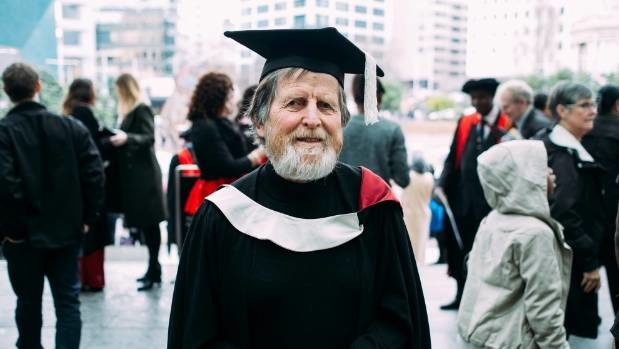
[March 2018] – The time of business as usual is at an end, says New Zealander Bruce Dyer.
The founder of Nelson’s Enterprise Loan Trust says capitalism is failing society, a view echoed by NZ’s deputy prime minister Winston Peters who recently stated “Far too many New Zealanders have come to view today’s capitalism, not as their friend, but as their foe.”
Communities need to move away from a materialistic existence and toward self-reliance, resilience and co-operation, he says.
Dyer walks the talk.
He graduated last year with a Masters Degree in Philosophy after four years of part-time study with the Auckland University of Technology.
His thesis explores the scope for economic self-reliance in the Nelson region.
Article continues below the picture

The work involved a focus group of community leaders and was supervised by AUT’s Professor of Public Policy and former MP Marilyn Waring.
The question posed to the focus group was ‘what gives life to the regional economy and what could the future be?’
Dyer says the Nelson Enterprise Loan Trust recycles wealth in the community.
The idea of regional self-reliance expands it into a wider context.
“We have to stop being mesmerised by our materialistic existence,” he says.
“We need to look at things differently and be less exposed and more resilient to climate change and the instability of capitalism.”
His thesis is his attempt to draw attention to the need to stop doing business as usual.
“Business as usual says it’s okay for a handful of rich people to wallow in luxury while we have 295,000 New Zealand children living in poverty.
“Business as usual says it’s okay for single mothers being asked to pay $600 a week to rent an Auckland home.
“Business as usual means a continuation of the top down control exercised by global corporate interests, leaving regional economies dependent on the whims of shareholders living on the other side of the planet.”
Dyer’s thesis suggests that the Progressive Utilisation Theory (PROUT) a socio-economic theory propounded in 1959 by the Indian philosopher P. R. Sarkar, could provide a way forward.
It is based on a spiritual rather than materialistic conception of the universe offering a different more holistic view of economics, history and political leadership.
Examples of the theory at work could see the region’s two councils join with the Nelson-Marlborough Institute of Technology and the Nelson-Marlborough District Health Board to create a not-for-profit organisation which purchased goods and services from worker-owned cooperatives.
Another would see a percentage of fishing quota held by a community development corporation.
“Self-reliance offers a way for regional economies to interact with the rest of the world from a position of strength,” says Dyer.
“We need to be less exposed and more resilient.”
“Instead of the financial power being top-down as is true under capitalism, PROUT envisions increasingly self-reliant yet inter-related regional economies each constituting a financial centre in their own right.”
Dyer says his thesis is a wake-up call to the community, a way to sow the seed of change.
He also holds an Honours Degree in Economics and a Diploma in Economic Development.

Namaska
HArizona deva how are you I am back in the far North Tarakansth